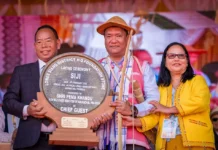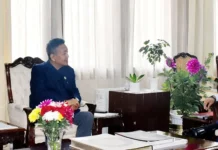YUPIA, 12 Dec: “Eliminating malaria is not just a health priority but a social and economic imperative,” said Papum Pare DC Jiken Bomjen while chairing a District Malaria Elimination Task Force meeting at the DC office conference hall here on Thursday.
During the meeting, which was convened to review the progress of malaria elimination efforts and strategise the implementation of advanced measures to achieve a malaria-free status for the district, the DC said that “with a united front and rigorous implementation of our strategies, we can achieve a malaria-free district and improve the overall quality of life for our citizens.”
He also emphasised the vital role of community involvement in malaria elimination and urged local leaders, religious leaders, health volunteers and civil society organisations to actively participate in the campaign.
He further highlighted the need for coordination among various departments, including education, water resource development, PHE, veterinary and fisheries, to address environmental factors contributing to the spread of malaria.
National Vector Borne Disease Control Programme Director Dr KT Mulung presented a detailed review of the state’s malaria statistics, focusing on areas with high incidence rates.
He also dwelt on the impact of the ongoing interventions such as insecticide-treated bed nets, indoor residual spraying, and anti-malarial treatment distribution.
“These interventions have greatly reduced the vector-borne diseases in the state, resulting in 14 districts of Arunachal Pradesh being declared malaria-free,” Dr Mulung added.
District vector-borne disease control programme nodal officer Dr Tana Aruna Likha presented Papum Pare district’s vector-borne disease statistics.
“Till November 2024, Papum Pare has recorded only one case,” she informed, and urged all the stakeholders to intensify the efforts to completely eliminate malaria from the district.
Dr Likha also highlighted the ill-effects of DDT and the alternatives that can be used in its place.
The task force further deliberated optimal utilisation of resources, including funds; strengthening disease surveillance systems to detect and treat cases promptly; medical supplies, and workforce, to ensure the programme’s effectiveness. (DIPRO)




